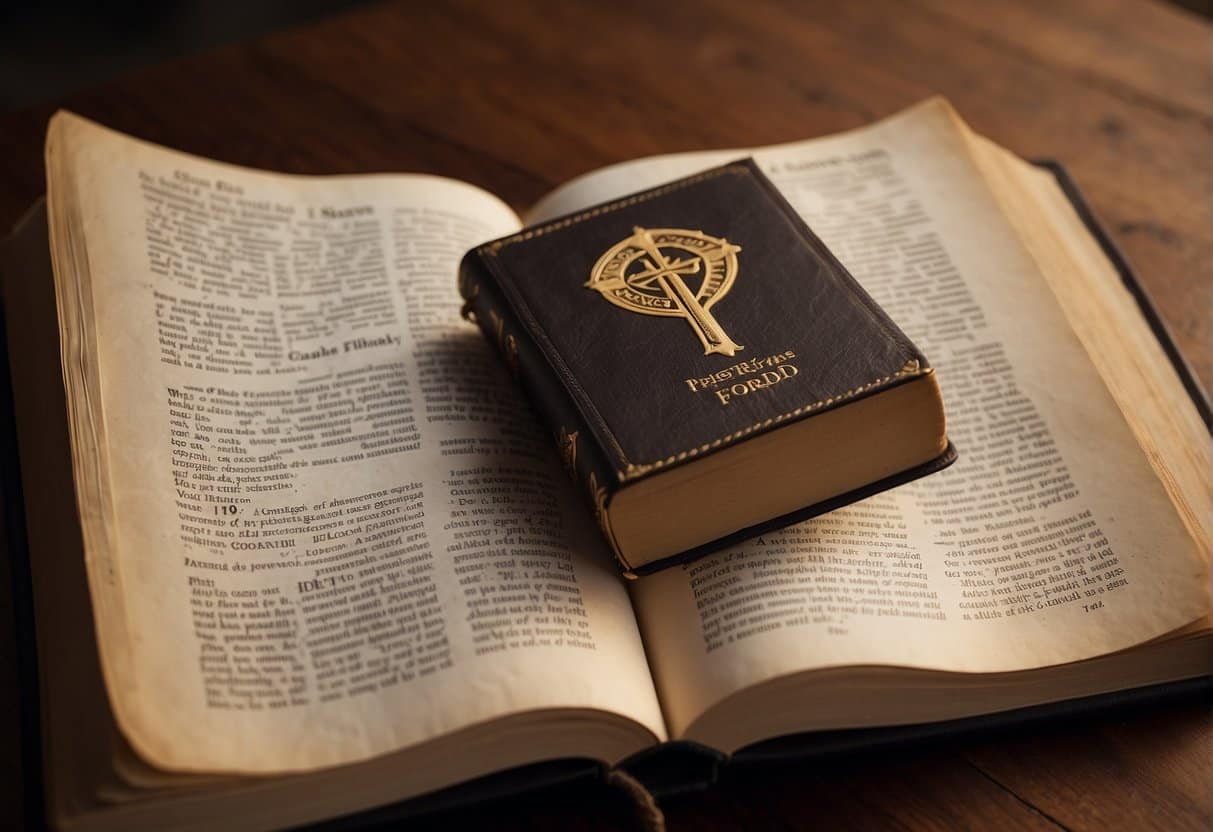If you are a Presbyterian or are interested in learning about their beliefs, you may wonder what Presbyterians believe about the Bible.
The Bible is the foundation of the Presbyterian faith, and it is considered the written Word of God.
Presbyterians accept that the Bible is the only infallible rule of faith and practice, and it contains everything necessary for salvation.

Presbyterians consider that the Bible is divinely inspired and was written by human authors under the guidance of the Holy Spirit.
They believe that the Bible is the authoritative source of Christian doctrine and that it is the final authority in matters of faith and practice.
Presbyterians interpret the Bible through the lens of the Reformed tradition, which emphasizes God’s sovereignty, grace, and covenantal relationship with humanity.
Presbyterians also believe that the Bible is a living document that speaks to us today. They believe that the Holy Spirit continues to guide and illuminate the meaning of the Bible for each generation.
Presbyterians study the Bible in the community, using a variety of interpretive tools and methods, and they seek to apply its teachings to their daily lives.
Biblical Authority in Presbyterianism
Presbyterians believe that the Bible is the ultimate authority in matters of faith and practice.
The Bible is considered the written Word of God and is the foundation of the Presbyterian faith.
The Role of Scripture
The Bible is seen as the primary source for understanding God’s will and purpose. It is the ultimate authority for all matters of faith and practice.
Presbyterians think that the Bible is the inspired Word of God and that it contains all that is necessary for salvation. The Bible is also seen as a guide for Christian living and is used to provide direction and guidance for believers.
Inspiration and Interpretation
Presbyterians acknowledge that the Bible is the inspired Word of God. This means that the Holy Spirit guided the authors of the Bible to write what they did. The Bible is therefore considered to be without error in all that it teaches.
Presbyterians consider that the Bible must be interpreted in light of its historical and cultural context.
This means that the Bible must be understood in the context of the time and place in which it was written. This helps to ensure that the true meaning of the text is understood.
Interpretation of the Bible is also guided by the rule of faith. This means that the Bible is interpreted in light of the teachings of the church.
The rule of faith helps to ensure that the interpretation of the Bible is consistent with the teachings of the church.
In conclusion, Presbyterians believe that the Bible is the ultimate authority in matters of faith and practice.
It is the inspired Word of God and is without error in all that it teaches. The Bible must be interpreted in light of its historical and cultural context and light of the teachings of the church.
Core Doctrines and Beliefs In The Bible

Presbyterians believe that the Bible is the inspired word of God and the ultimate authority in matters of faith and practice.
The Westminster Confession of Faith, a statement of faith adopted by many Presbyterian churches, summarizes the core doctrines and beliefs of the Presbyterian Church.
Salvation and Grace
Presbyterians believe that salvation is a gift of God’s grace, received through faith in Jesus Christ.
This belief is based on the Bible’s teaching that all people are sinners and separated from God, and that salvation is only possible through Jesus Christ, who died on the cross to pay the penalty for our sins.
Covenant and Election
Presbyterians accept that God has made a covenant with his people and that this covenant is based on his grace and mercy.
They also believe in the doctrine of predestination, which teaches that God has chosen certain people for salvation before the foundation of the world.
Sin and Redemption
Presbyterians assume that all people are sinners and in need of redemption. They believe that Jesus Christ is the only way of salvation and that his death on the cross and resurrection from the dead provide the only means of forgiveness for sin.
They also believe in the doctrine of original sin, which teaches that all people are born with a sinful nature.
They believe in salvation by grace through faith in Jesus Christ, the doctrine of predestination, and the need for redemption from sin.
Presbyterian Governance and Structure

Presbyterians have a unique form of church governance and structure that is based on the Bible. The Presbyterian Church is led by a hierarchy of governing bodies, which are responsible for the administration and oversight of the Church.
The governance and structure of the Presbyterian Church are designed to ensure that the Church is run in a democratic and accountable manner.
Church Organization
The Presbyterian Church is organized into three levels of governing bodies: the Session, the Presbytery, and the General Assembly.
The Session is the governing body of the local church, and it is responsible for the day-to-day management of the church. The Presbytery is the governing body of a group of churches in a particular area, and it is responsible for the coordination of the activities of these churches.
The General Assembly is the highest governing body of the Presbyterian Church, and it is responsible for setting the policies and direction of the Church.
Role of Elders and Assemblies
Elders play a crucial role in the governance and structure of the Presbyterian Church. Elders are elected by the members of the local church to serve in the Session, and they are responsible for the spiritual oversight of the church.
Elders are also elected to serve on the Presbytery and the General Assembly, where they help to make decisions about the policies and direction of the Church.
Assemblies are another important aspect of the governance and structure of the Presbyterian Church.
Assemblies are meetings of the governing bodies of the Church, and they are held at the local, regional, and national levels.
Assemblies provide a forum for the discussion and debate of issues facing the Church, and they help to ensure that the Church is run in a democratic and accountable manner.
Worship and Sacraments
Presbyterians believe that worship is the central part of their faith. Worship is a way to glorify God and enjoy Him forever. It is a time to come together as a community to praise God, hear His word, and receive His grace.
Worship services are held on Sundays, and they include prayer, singing, reading of the Bible, and preaching.
Worship Practices
Presbyterians follow a traditional order of worship that includes four basic parts: Gathering, Word, Response, and Sending. During the Gathering, the congregation comes together, and the service begins with a call to worship. In the Word portion, the Bible is read, and a sermon is given.
During the Response portion, the congregation responds to the Word by singing hymns, praying, and confessing their sins. Finally, in the Sending portion, the congregation is sent out into the world to share the love of Christ.
Baptism and Communion
Presbyterians practice two sacraments: Baptism and Communion. Baptism is a sacrament of initiation into the Christian faith. It is a sign and seal of God’s grace, a symbol of new life in Christ, and a promise of eternal life. Baptism is administered to infants, children, and adults.
Communion, also known as the Lord’s Supper, is a sacrament of remembrance of Christ’s sacrifice on the cross. It is a time to remember Christ’s death and resurrection and to renew our commitment to Him.
During Communion, the congregation receives bread and wine, which symbolize Christ’s body and blood.
Presbyterianism in Context
Presbyterianism is a branch of the Protestant Reformation movement that originated in Switzerland in the 16th century under the leadership of John Calvin.
The Presbyterian Church has a rich history and has played an important role in the development of modern Christianity. Today, there are many different Presbyterian denominations with varying beliefs and practices.
Historical Development
Presbyterianism emerged in the 16th century during the Protestant Reformation.
The movement was led by John Calvin, who believed in the sovereignty of God and the authority of the Bible. Calvin’s teachings emphasized the importance of predestination, the idea that God has already determined who will be saved and who will be damned.
Presbyterianism spread throughout Europe and eventually made its way to America in the 17th century.
The Presbyterian Church in America (PCA) was formed in 1973 as a conservative alternative to the Presbyterian Church (USA) (PCUSA), which had become more liberal in its beliefs and practices.
Modern Denominational Landscape
Today, there are many different Presbyterian denominations with varying beliefs and practices.
The PCUSA is the largest Presbyterian denomination in the United States and is known for its progressive stance on social issues. The PCA is a more conservative denomination that emphasizes the authority of scripture and the importance of personal salvation.
Other Presbyterian denominations include the Evangelical Presbyterian Church (EPC), the Orthodox Presbyterian Church (OPC), and the Presbyterian Church in Ireland (PCI).
Each denomination has its unique history and beliefs, but all share a commitment to the authority of scripture and the sovereignty of God.
Despite the diversity, Presbyterians believe in the Bible, as mentioned above.
These include a belief in the Trinity, the divinity of Jesus Christ, and the importance of salvation through faith in Jesus. Presbyterians also practice two sacraments, baptism, and the Lord’s Supper, and uphold confessions as detailed expressions of their faith.
